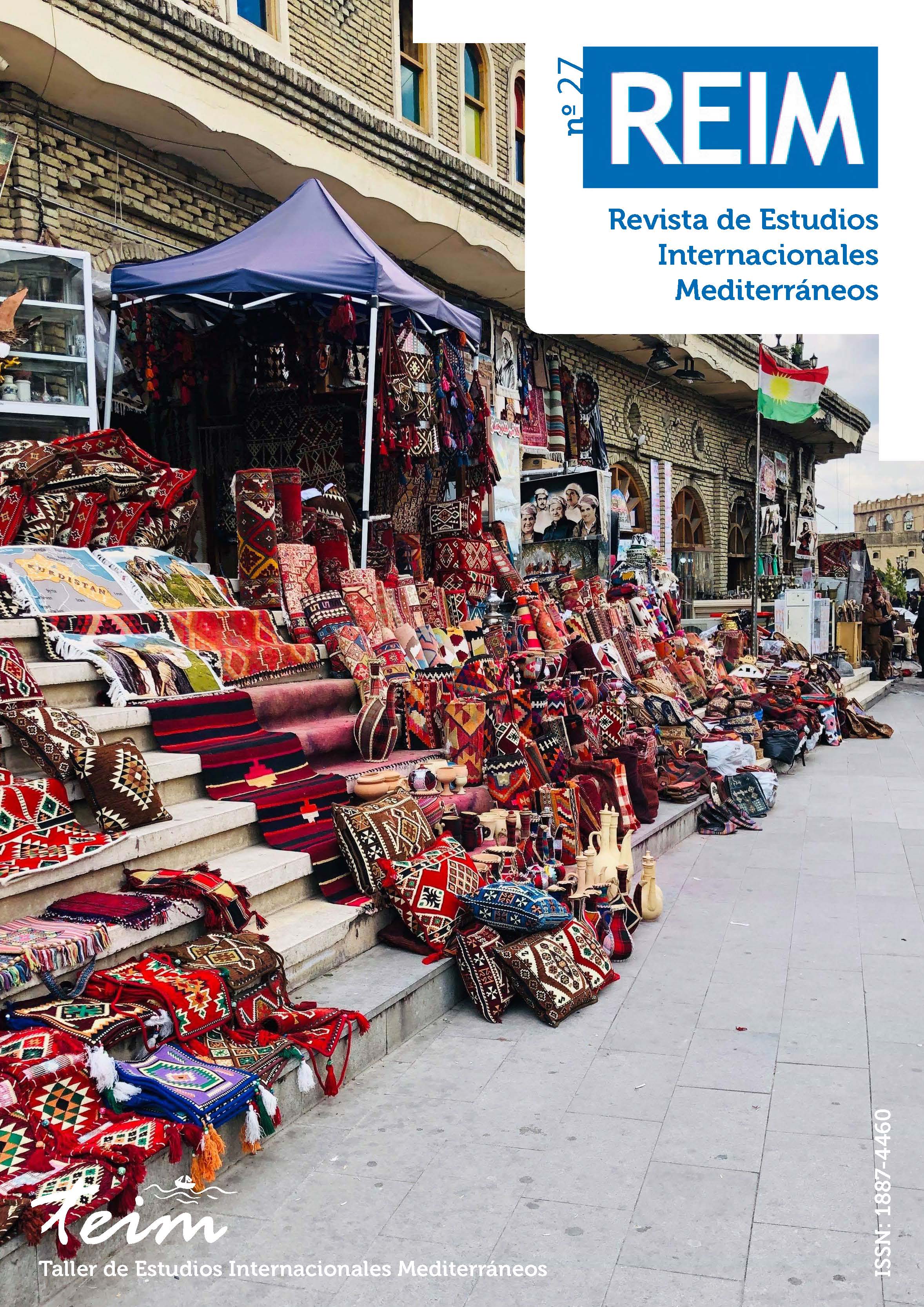Las relaciones del Kurdistán con el Golfo: el papel de las monarquías árabes en la lucha kurda en Irak y Siria.
Mots-clés :
Kurdistán, Golfo, Arabia Saudí, relaciones internacionales, seguridad regionalRésumé
La situación reciente en Iraq y Siria ha favorecido el auge político de los movimientos kurdos en estos Estados, que buscan mayores cuotas de autonomía o la independencia. Gracias a su resistencia al régimen de Al Asad y su fortaleza frente al Daesh, las milicias kurdas obtuvieron el respaldo de potencias extranjeras. Desde ese espacio del Kurdistán se intenta adquirir cierto protagonismo internacional, diversificando relaciones con terceros países. Entre sus apoyos están Estados Unidos, Gobiernos de la Unión Europea y Rusia, pero también actores de Oriente Medio, como Arabia Saudí, Catar o Emiratos Árabes Unidos. Este artículo analiza las relaciones entre los principales actores políticos del Kurdistán iraquí y sirio con miembros del Consejo de Cooperación del Golfo desde 2011 hasta la actualidad. Se estudian los intereses y estrategias sauditas y de los demás regímenes, así como la importancia de estos apoyos para las causas kurdas.
Téléchargements
Références
AFTANDILIAN, Greogry. (2018): “Is there a US policy toward the kurds in Iraq and Syria?” en Policy Analyses. Arab Center Washington DC. February 21, 2018. Disponible en: http://arabcenterdc.org/policy_analyses/is-there-a-us-policy-toward-the-kurds-in-iraq-and-syria/ [Consulta 19 de agosto de 2019]
ÁLVAREZ-OSSORIO, Ignacio. (2015): “El enroque autoritario del regimen sirio: de la revuelta popular a la guerra civil” en Revista CIDOB d’Afers Internacionals. N. 109: 157-176.
BARFI, Barak. (2016): “Ascent of the PYD and the SDF” en Research Notes. The Washington Institute for Near East Policy. No 32. April 2016. Disponible en: https://www.washingtoninstitute.org/policy-analysis/view/ascent-of-the-pyd-and-the-sdf [Consulta 2 de agosto de 2019]
Barkey, Henri J. (2016): “Syria’s dark shadow over US-Turkey relations” en Turkis Policy Quarterly. Winter 2016. Volume 14, Number 4: 25-36.
BASSAM, Laila; y PERRY, Tom. (2018): “Friend or foe? Assad quietly aids Syrian Kurds against Turkey” en Worlds News. Reuters. Febraury 11, 2018. Disponible en: https://www.reuters.com/article/us-mideast-crisis-syria-turkey-kurds/friend-or-foe-assad-quietly-aids-syrian-kurds-against-turkey-idUSKBN1FV078 [Consulta 4 de agosto de 2019]
BERTI, Benedetta; y PARIS, Jonathan. (2014): “Beyond Sectarianism: Geopolitics, Fragmentation, and the Syrian Civil War” en Strategic Assessment. Volume 16, No 4, January 2014: 21-34.
BLANK, Stephen. (2018): “Imperial strategies: Russia’s exploitation of ethnic issue and policy in the Middle East” en Karasik, Theodore and Blank, Stephen (ed.): Russia in the Middle East. Washington: The Jamestown Foundation, December 2018.
CARRIÓN, Francisco. (2019): “El clan de los Barzani, la nueva ‘familia real’ de Oriente Próximo” en La Otra Crónica de El Mundo. 3 de junio de 2019. Disponible en: https://www.elmundo.es/loc/casa-real/2019/06/03/5cf10b68fdddffc9538b4649.html [Consulta 8 de agosto de 2019]
CHAROUNTAKI, Marianna. (2016): “The GCC in Kurdish politics” en Journal of Arabian Studies. (6), 2: 201-215. DOI: https://doi.org/10.1080/21534764.2016.1242232
COLLARD-WEXLER, Simon. (2006): “Integration under anarchy: Neoralism and the European Union” en European Journal of International Relations. Vol 12 (3): 397-432. https://doi.org/10.1177/1354066106067349
CORDESMAN, Anthony. H. (2003): Saudi Arabia enters the Twenty-First Century. The political, foreign policy, economic, and energy dimensions. Wesport, Connecticut: Praeger and Center for Strategic and International Studies.
ESPINOSA, Ángeles. (2014): “Kurdistán, el otro Irak” en El País. Disponible en: https://elpais.com/elpais/2014/09/26/eps/1411747854_347049.html [Consulta 4 de agosto de 2019]
FULLER, Graham E. (2003): “Islamist politics in Iraq after Saddam Hussein” en Special Report 108. August 2003. USIP United States Institute of Peace. Disponible en: https://www.usip.org/sites/default/files/sr108.pdf [Consulta 18 de agosto de 2019]
GARDUÑO, Moisés. (2017): “El final del régimen Sykes Picot en Medio Oriente: hacia un nuevo
punto de inflexion” en Revista de Estudios Internacionales Mediterráneos. REIM- Nº 22: 109-128. https://doi.org/10.15366/reim2017.22.005
GROJEAN, Olivier. (2018): “The Kurdish question in the Middle East: regional dynamics and return to national control” en Strategic Sectors/Security & Politics. Panorama. IEMed. Mediterranean Yearbook 2018: 265-268.
HAMMOND, Andrew. (2018): “Producing salafism: from invented tradition to state agitprop” en AL-RASHEED, Madawi. (ed.): Salman’s legacy. The dilemmas of a new era in Saudi Arabia. London: Hurst & Company.
HENDERSON, Christian. (2017): “The UAE as a nexus state” en Journal of Arabian Studies. (7)1: 83-93. DOI: http://dx.doi.org/10.1080/21534764.2017.1310534
HERNÁNDEZ, David. (2019): La política exterior de Arabia Saudí en Oriente Medio tras la primavera árabe. Objetivos y estrategias regionales (2011-2016). Tesis Doctoral. Universidad Complutense de Madrid. Disponible en: https://eprints.ucm.es/51661/ [Consulta 8 de agosto de 2019]
HINNEBUSCH, Raymond. (2014): “The Middle East regional system” en HINNEBUSCH, Raymond and EHTESHAMI, Anoushiravan. (ed.): The Foreign Policies of Middle East States. London: Lynne Rienner Publisher, Second Edition.
